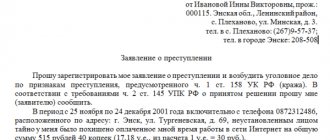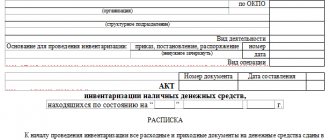Free legal consultation over the Internet 24 hoursLawyer on housing issues in St. Petersburg. Free legal consultation on labor disputes.
5/5 (1)
How to file a report of property damage to the Police
A citizen who has suffered damage from damage to property owned by him has the right to initiate an appeal to the Police to clarify the circumstances of the incident.
Attention! To do this, you must submit a written application indicating:
- position, special rank, surname and initials of the head of the Police unit in whose name the document is submitted;
- postal address of the location of the Police unit indicating the name of the locality, street name, building number;
- last name, first name, patronymic, residential address, contact information of the applicant in the form of a landline or mobile phone number, email address;
- the name of the document is “Crime Statement”;
- a statement of the circumstances under which the damage or destruction of property occurred, the amount of damage caused, other information and data directly related to the circumstances of the case;
- information about the person who is guilty of damage or destruction of property, including his personal data, residence address, contact information (if known);
- how guilt is confirmed, the presence of witnesses and their data;
- instructions on criminal liability under Article 306 of the Criminal Code for knowingly false denunciation;
- list of attached documents;
- day, month, year of drawing up the application, signature, surname and initials of the applicant.
The application is written at home or drawn up in the district police officer’s office. The law allows three days to verify the stated facts and make a decision on the merits of the application. This is directly provided for in Articles 144 and 145 of the Code of Criminal Procedure. The specified period can be extended to 10 days. And in some cases up to 30 days. However, this is only possible in cases where it is necessary to obtain a preliminary expert opinion.
Composition of the crime for filing an application
You can write a statement about damage to property even if it was minor (up to 2,500 rubles). The culprit will not be held criminally liable, but they may face administrative liability.
Practice is full of examples when a claim was filed for damage to someone else’s property, even if it was a scratch on a car or a broken smartphone screen. Of course, everyone understands that both phones and cars are different, and yet...
Application to the district police officer
The law does not provide for a specific sample according to which a statement should be drawn up to the district police officer.
However, practice has developed its own approach, so the following data should be reflected in it:
- position, rank, surname and initials of the district inspector, indicating the territorial police unit in which he works;
- last name, first name, patronymic of the applicant, address of his place of residence, means of contacting him in the form of a telephone number, email address.
All information must be entered correctly. Especially regarding information about the applicant. Anonymous appeals from citizens are not accepted for consideration. And if the applicant’s data contains incorrect or incorrect data, the document may be classified as anonymous. Accordingly, no verification will be carried out on it.
At the same time, if the application contains information about a crime committed or being prepared, the information is subject to mandatory verification, despite the anonymity of the message. In this case, it is generally accepted that the applicant fears for his life, so he does not provide his information or indicates a fictitious name.
Important! In the application submitted to the district police officer, it is necessary to indicate only essential information, in particular:
- about the circumstances of the event;
- date and time of the offense;
- about the presence of witnesses, indicating the data by which they can be identified.
As practice shows, individual applicants set out a certain list of requirements that the district police officer must fulfill. However, this is unnecessary, since the verification of the stated facts will be carried out in accordance with the requirements of the law. Therefore, the application should not be overloaded with such information.
At the end of the document, you must indicate the exact date of compilation, issue a personal signature and fully decipher your last name.
It is important to know that only a correctly compiled document will be accepted for consideration. Accordingly, it will be registered in accordance with the established procedure. Based on the results of the inspection, an appropriate decision will be made, which must be communicated to the applicant.
The law allocates a certain period of time for verification of the application. The minimum is three days. The maximum, if a thorough check, research and examination is necessary, should not exceed 30 days.
Attention! Our qualified lawyers will assist you free of charge and around the clock on any issues. Find out more here.
Appeal to the Prosecutor's Office
According to the Federal Law on the Prosecutor's Office, this body is charged with monitoring compliance with laws by citizens and government bodies. Therefore, if contacting the Police did not lead to the expected result, you can file a complaint with the Prosecutor’s Office.
Current legislation does not impose special requirements for documents addressed to the prosecutor. Therefore, they can be compiled in any form.
However, legal practice, taking into account the general principles of office work, has developed the following approach to the content of an application or complaint submitted to the Prosecutor's Office:
- the document is drawn up in writing by hand or in typewritten text on a piece of A4 paper;
- in the upper right corner of the sheet the position of the prosecutor, his class rank, surname and initials are indicated;
- the name of the territorial unit of the Prosecutor's Office, its address, including the name of the locality, the name of the street and the number of the building where it is located. You must contact the Prosecutor's Office, which is located in the area where the offense was committed. Consequently, the place of residence of the applicant and the place where the offense was committed may not coincide. Therefore, if this rule is not followed, the documents will be redirected for consideration by territoriality. 7 days are allotted for this, of which the applicant will be notified in writing;
- below, on the same right side, information about the applicant is indicated, including his last name, first name, patronymic, residential address, means of communication in the form of a telephone number, email address;
- the name of the document is written in the middle - “Application” or “Complaint”;
- the factual circumstances of what happened, as well as the reason for contacting the Prosecutor's Office, are set out on a new line;
- the essence of the stated appeal in the form of a request to conduct a prosecutorial investigation, to take measures to protect the rights and legitimate interests of the applicant; take prosecutorial response measures; provide assistance in restoring violated rights. An appeal to the prosecutor must contain complete information on the issue initiated, references to the rules of law and other legal acts that were violated;
- the appeal ends with a reference to the list of attached documents, if any;
- at the end - the day, month and year of the document, the signature of the applicant, his surname and initials.
If a written request is made by hand, the text must be readable. Otherwise, the document may be returned to the author for legible writing. Obscene language and offensive statements must be excluded. Threats are unacceptable, as this may lead to the initiator of the appeal being held accountable.
Application processing time
The law allows 7 days for a preliminary decision.
This means that during the specified period of time the Prosecutor’s Office can make one of the following comprehensive decisions:
- accept the application for consideration on its merits;
- leave the application without consideration, indicating the reason for such a conclusion;
- transfer the received documents to the lower Prosecutor's Office for consideration by territoriality;
- send materials to another law enforcement agency for consideration on the merits;
- stop considering the appeal;
- attach documents to the previously received application;
- return the documents to the applicant.
The prosecutor is given 15 days to make a final decision on citizens’ appeals. If additional verification is required, it must be completed within 30 days.
Remember! Based on the results, the prosecutor makes one of the following decisions:
- satisfy the applicant’s appeal and take measures to fully or partially restore the violated rights;
- satisfy the repeated appeal against the previous decision of the relevant Prosecutor's Office;
- recognize the applicant's demands as unfounded and reject their satisfaction;
- explain to the applicant legal issues regarding further actions;
- send an application to another Prosecutor's Office or department;
- return the documents to the applicant;
- leave a statement without permission;
- stop further correspondence with the applicant;
- attach materials to supervisory proceedings.
Watch the video. Damage to someone else's property:
Certificate from the Department of Internal Affairs in form No. 3 “On damage to the vehicle”
In order for an insurance company (IC) to make payments for an insured event, documents are required confirming the very fact of the existence of an insured event. If the damage to the car was caused by the actions of third parties, then in order to compensate for the damage caused to the insurance company, you need to submit a certificate from the department of internal affairs (OVD) in form No. 3. We will consider in this article when, how and from whom you need to take this document.
- To the head of this department of internal affairs;
- To the prosecutor's office;
- To the court (in this case, not a complaint is filed, but a statement of claim).
Claim to a judicial authority
The next way in which you can protect your rights and legitimate interests violated by damage to property is to file a claim in court. Article 131 of the Code of Civil Procedure imposes certain requirements on a claim.
Attention! If they are not met, the court will leave the claim without progress, and the plaintiff will be given time to bring the claim to the requirements set out in this article, namely:
- the name of the court to which the claim is filed, indicating the name of the locality, the name of the street and the number of the building where the judicial body is located;
- last name, first name, patronymic of the plaintiff, address of his place of residence, means of contacting him in the form of a telephone number, email address;
- surname, name, patronymic of the defendant, address of his place of residence;
- price of claims;
- the title of the document is “Statement of Claim for Recovery of Damage Caused and Compensation for Moral Damage”;
- circumstances of damage resulting from damage or destruction of property;
- how the amount of material damage and moral damage is determined;
- whether measures were taken to resolve the dispute pre-trial, how the defendant responded to this;
- legal grounds for going to court;
- the essence of the claims;
- list of attached materials;
- date, month, year of filing the claim, signature, surname, initials of the applicant.
In addition, to achieve better results, it is recommended to use the following recommendations:
- The events that occurred must be presented in chronological order. This will allow us to most fully and accurately reflect the course of real events;
- the factual circumstances of the case should be presented succinctly and completely. If there is a lack of agreement that may arise after reading the claim, a suspicion may arise that the plaintiff is hiding something;
- the text of the document must be presented in paragraphs with a complete thought;
- You cannot jump from one event to another.
Claims of a material nature are subject to state duty. However, if a claim is filed for compensation for property damage and moral harm caused by a crime, then in accordance with paragraph 4 of part 1 of Article 333.36 of the Tax Code, the state duty is not paid.
If the value of the claims does not exceed 50 thousand rubles, the case will be considered by the magistrate court. If the amount of claims exceeds the specified amount, the case is subject to consideration by a district or city court.
It should be borne in mind that an acquittal in a case does not deprive the victim of the right to file a claim for compensation for damage caused. In this case, one should be guided by Article 1064 of the Civil Code. However, in this case, the claim will be subject to a state fee, the amount of which depends on the amount of the claim.
To make a decision on the merits of the stated claim, the law allocates one month for the magistrate court, and two months for the district court.
Further actions
Based on the statement of the victim, the criminals are brought to justice, however, the essence of the victims’ claims usually lies not only in fair punishment for the perpetrators, but also in compensation for their own losses. To do this, you need to re-apply to the court that heard the case with a claim for financial compensation.
Let us look at a number of nuances that you need to know when applying to the courts.
To receive compensation, you must provide the court with information about the value of the damaged or destroyed property. In cases where we are talking about arson, flooding of apartments, or intentional damage to vehicles, you need to contact an independent expert company. Appraisers will determine the current value of the item, and the report prepared by such organizations is accepted by the court as unconditional evidence.
However, there are often situations when the damage caused is insignificant, and the costs of expert services far exceed the actual damage. Here you will have to act independently, providing as evidence data on the price of property with similar characteristics or receipts for expenses incurred for restoration.
Important!
If a claim for compensation is filed during investigative actions, payment of state duty is not required. This practice does occur. If the accused does not agree with the plaintiff's demands, he has the right to challenge the amount of compensation by filing a motion to reconsider the case. Let us immediately note that this is a very labor-intensive process, and the applicant will most likely be required to provide reasoned justification for the legal proceedings.
Liability for property damage
Damage to property should be understood as the illegal actions of an attacker to cause material damage and moral harm by damaging or destroying the property of another citizen. In this case, damage and harm can be caused both intentionally and through negligence.
As for the very concept of “damage to property,” it means the complete or partial destruction of property. If the items are partially damaged, they cannot be used for their intended purpose, but their functions can be restored as a result of repair or restoration. If the property is destroyed, the owner will no longer be able to use it or restore it as a result of repairs.
Important! To prosecute the person guilty of damaging property, the amount of damage caused must be:
- in case of intentional damage to property - an amount of more than 2,500 rubles;
- in case of damage due to negligence - over 250 thousand rubles.
Company advantages
Turn on the sound on the video!!
Free consultation with a criminal lawyer
Free hotline (Moscow and regions of the Russian Federation)
Consultations in a mobile application
If the actions of the guilty person cause significant damage to property assets, the owner may demand simultaneous prosecution of both types of liability. However, only in criminal proceedings will state law enforcement agencies protect the owner.
Deliberate damage
Intent presupposes that the perpetrator has the direct intention to damage or completely destroy someone else's thing or other property. Such actions of the guilty person are subject to qualification under Article 167 of the Criminal Code.
If a citizen whose actions led to damage or destruction of property could not understand the meaning of his actions, then his actions cannot be qualified under this article of the Criminal Code.
The sanction of Part 1 of Article 167 of the Criminal Code provides for the following types of punishments for the guilty person:
- a fine of up to 40 thousand rubles or recovery of the amount of earnings for 3 months;
- corrective, compulsory or forced labor;
- arrest or up to 2 years in prison.
For Part 2, the sanctions are much stricter. This is up to 5 years in prison. Such punishment can be caused by the actions of the perpetrator, which show signs of damage or destruction of property due to hooliganism, by arson, explosion or the use of another dangerous method, or if the actions of the attacker led to the death of a person or the onset of other serious consequences. These include causing bodily harm, stopping the operation of an enterprise, disconnecting consumers from water and gas supplies, and from electricity supplies.
In what cases should I go to court?
Having discovered the fact of property damage, the victim contacts the relevant law enforcement agencies. The actions of violators of the law are subject to criminal or administrative liability depending on the severity of the crime and the amount of damage.
This article talks about typical ways to resolve the issue, but each case is unique. If you want to find out how to solve your particular problem, call:
- Moscow .
- Saint Petersburg .
Or on the website. It's fast and free!
The victim contacts the authorities in the following cases:
- There was destruction or damage to property on a large scale, the act was committed intentionally (Article 167 of the Criminal Code of the Russian Federation). According to the article, a penalty of 40,000 rubles is provided. up to 5 years of imprisonment.
- Destruction or damage to property that occurred unintentionally is provided for in Art. 168 of the Criminal Code of the Russian Federation. If the law is violated by a minor, responsibility shifts to guardians or parents.
- Damage to property on a small scale is punishable by administrative sanctions.
Based on his testimony, a protocol will be drawn up, evidence will be collected and the case will be brought to court. If for any reason the victim is refused to accept a statement from the police, he should contact the prosecutor's office.
A written statement to the police or prosecutor's office is made as follows:
- the standard header includes the name of the law enforcement agency, information about its head (full name, position, rank), personal data of the victim;
- a description of the facts of the case and information about the violators of the law (they can be accurate or speculative);
- requirement to bring the alleged culprit to justice;
- date and signature of the applicant.
To recover damages, a claim for damage to property is filed in court. It can be sent by mail or brought in person to the courthouse.
Costs for the services of an appraiser are usually included in the compensation presented to the defendant. The statement of claim is drawn up in accordance with the provisions of Art. 131, 132 Code of Civil Procedure of the Russian Federation. In addition, the following documents must be attached to it:
- copies of the application in the amount of all persons (defendant, third parties) involved in the case;
- a document confirming payment of the state duty;
- a power of attorney confirming the rights and powers of the person representing the victim;
- documents containing the facts of the incident on the basis of which the plaintiff demands compensation for damage (copies of these documents are required for the defendant and third parties);
- the text of the regulatory legal act in case of a challenge and the facts confirming the pre-trial settlement of the dispute, if this is provided for by law or contract;
- assessment of the amount of the penalty (an assessment examination is carried out in advance), which must be signed by the applicant and his representative (the required number of copies is required).
To file a claim for property damage properly and avoid mistakes, it is better to take legal help.
Statement to the police
Damage due to negligence
Causing property damage by damaging or destroying property as a result of careless actions of the guilty person. entails liability under Article 168 of the Criminal Code.
The sanction of the article provides for punishment in the form of:
- a fine of up to 120 thousand rubles or in the amount of the wages of the perpetrator in the amount of up to 1 year;
- compulsory work lasting up to 480 hours or correctional work lasting up to 2 years;
- forced labor for up to 1 year;
- restriction of liberty for a period of up to 1 year or imprisonment for the same period.
Damage to the vehicle by third parties
Telephone 112 is part of the system of information interaction and emergency response of duty dispatch services of emergency operational services, including the police service (Resolution of the Government of the Russian Federation of March 16, 2013 N 223). Phone 02 is the police dispatch number. Both numbers are the same throughout the Russian Federation.
It should be taken into account that some mobile operators may have different methods for dialing 02 (002, 102, 020, etc.).
Within three days from the date of receipt of your application, the police officer conducting its verification issues a decision to refuse to initiate criminal proceedings or to initiate criminal proceedings. Moreover, in a number of cases, at the request of the person conducting the inspection, this period can be extended to 30 days (Parts 1, 3 of Article 144, Part 1 of Article 145 of the Code of Criminal Procedure of the Russian Federation).
The car was parked next to the house. In the morning I found scratches on the doors and fender. What should you do if hooligans damage your car?
When submitting an application, present a passport or other identification document, documents for the car (vehicle registration certificate), power of attorney, if it is not the owner who is filing the application with the police. Note. The decision to refuse to initiate a criminal case can be appealed to the prosecutor, the head of the investigative body or to the court (Part 5 of Article 148 of the Code of Criminal Procedure of the Russian Federation).
- Since the circumstances of the incident are unknown, there is a possibility that the incident was not insured;
- If the date and time of the event are unknown, the application deadlines may have been violated.
The most common mistake when filing an application for compensation under CASCO. Many car owners, when filing one insurance claim, describe several damages that occurred as a result of different events and at different times. How to correctly file a police report against neighbors, sample to a local district police officer? For example, today a pebble hit the glass, and tomorrow the bumper was damaged in the parking lot. One should not be tempted to claim first and second damages in one event.
The insurance company will completely or partially refuse payment. Based on the above, I ask: Within 10 days, to compensate for the damage caused to me in the amount of ... rubles, by transferring funds to my bank account using the following details: ... Otherwise, I reserve the right to go to court. And as it turns out, the urgency is so great that the future depends on it.
At what age can they be attracted?
Current criminal legislation provides that liability for damage or destruction of property begins when a citizen reaches the age of 16. In the presence of aggravating circumstances that lead to injuries, liability begins at the age of 14.
Please note! The type of punishment, as well as its duration, is applied by the court depending on the degree of guilt of the attacker, as well as the amount of damage caused. Only the personal property of citizens is the subject of a criminal attack. This can be either movable or immovable property.
Administrative responsibility
Citizens who cause damage amounting to less than 5,000 rubles are held administratively liable. This may include the following offenses:
- broken glass in the entrance/apartment;
- broken dishes in catering establishments;
- small scratch on the car;
- damage to clothing.
Important! The limitation period for such claims is 3 months. If the period has expired, the paperwork is terminated, the degree of guilt of the suspect is not clarified.








